
In 2023, the Association for Advancing Physician and Provider Recruitment (AAPPR) released its second Physician Recruiter Workplace Satisfaction Survey. Here are five ways physician recruiters' job satisfaction and feelings about their jobs have changed since the first survey was administered in 2019.
1. Work/life balance improved and stress decreased
Physician recruiters are more satisfied with their work/life balance than four years ago, with two-thirds of those surveyed rating their work/life balance as “excellent” and “good.” The number of physician recruiters reporting excellent work/life balance increased from 25% in 2019 to 29% in 2023.
Recruiters' rating of their work/life balance
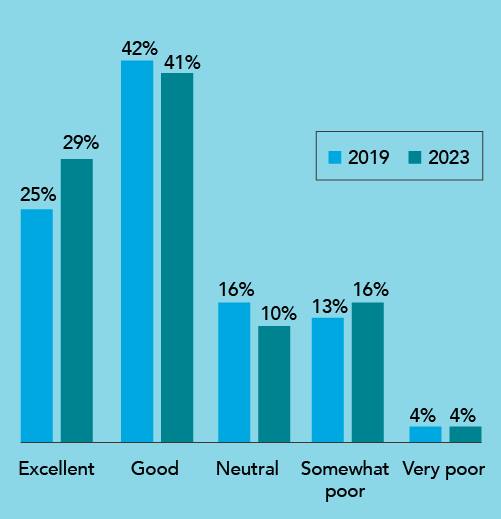
While work/life balance varies due to one’s role and the size of their organization — those from larger organizations or who hold more prominent roles report less work/life balance — the improvement is promising, as work/life balance is also a top factor for overall job satisfaction.
Likewise, recruiters are feeling less stressed than in 2019. The survey found a 5% decrease in the number of recruiters who reported a very high degree of stress in their jobs, from 26% in 2019 to 21% in 2023. Likewise, 45% reported a somewhat high degree of stress in 2023, compared to 49% in 2019.
2. Personal fulfillment declined — and affected job satisfaction
Eight in 10 physician recruiters (81%) reported high personal fulfillment in 2019. That number dropped to seven in 10 (70%) in 2023. The survey also found that personal fulfillment was the most important factor in overall job satisfaction.
Despite a decline in those reporting a high level of personal fulfillment in their career — the most important factor of job satisfaction — nearly three-fourths (73%) of physician recruiters surveyed said they were at least somewhat satisfied with their current position or role. Other top factors that impact job satisfaction include work/life balance, a sense of accomplishment, involvement in decisions, recognition for work, and feeling valued by the organization.
Recruiters' overall satisfaction with current position or role
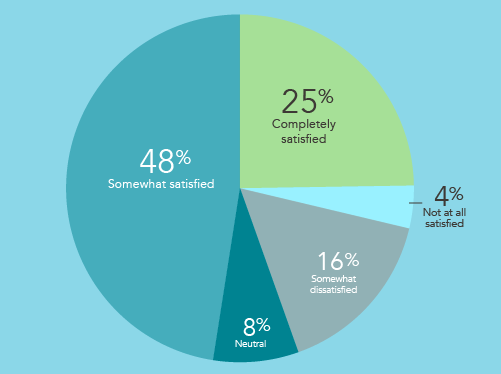
However, one in five (20%) physician recruiters said they were “somewhat dissatisfied” or “not at all satisfied” at work. They also reported being understaffed and having a poor work/life balance, both top factors impacting satisfaction.
3. Physician recruiters want to feel valued and involved at work
In 2019, 37% of recruiters surveyed felt they were sufficiently involved in decisions that affect their work, a number that declined to 27% in 2023. Additionally, many physician recruiters don’t feel recognized for their work. While 34% felt their company recognized them for their work in 2019, only 31% strongly agreed with this statement in 2023.
Finally, fewer physician recruiters say they feel valued by their organization — a statement 37% strongly agreed with in 2019 and 31% strongly agreed with in 2023.
One aspect of physician recruiter job satisfaction that has remained the same is employee feedback. In 2019 and 2023, 41% of physician recruiters surveyed said their department encourages employee feedback and improves based on that feedback.
Physician recruiters' workplace sentiments in 2023
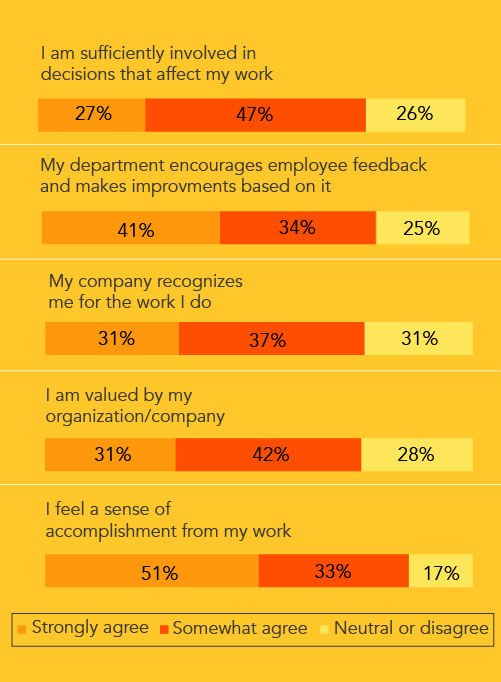
Be recognized: 6 ways to demonstrate your value as a physician recruiter
4. Satisfaction with compensation dropped
The survey showed a significant decline in recruiters’ satisfaction with their earnings. While 56% of physician recruiters rated their compensation as good in 2019, only 43% did in 2023 — a 13% drop.
Interestingly, compensation was ranked near the bottom when recruiters were asked what impacts their job satisfaction. Only “opportunity for advancement” and “cell phone” fell below pay, while work/life balance, a sense of accomplishment, and equitable work distribution affected physician recruiter job satisfaction more significantly.
Factors affecting recruiters' job satisfaction
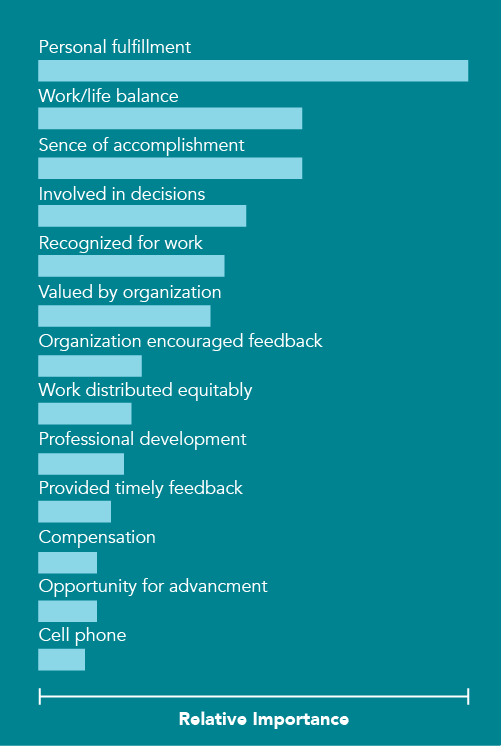
5. Physician recruiters report numerous work challenges
Physician recruiters said the most difficult aspects of their work were leadership challenges, including frequent turnover, lack of experience or recruitment knowledge, and unsupportive managers.
Time management was also a frequently mentioned challenge, with recruiters reporting heavy workloads, changing and competing priorities, a lack of support staff, and too many non-core tasks.
Other challenges included communication issues, a slow hiring approval process, and issues finding candidates.
Top challenges physician recruiters experience on the job
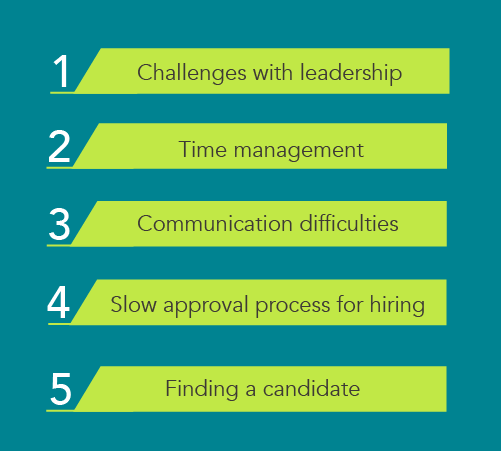
Think outside the box: Creative ways to overcome staffing challenges
6. One in three recruiters plans to leave their organization
About two-thirds (63% ) of physician recruiters plan to stay with their current organization during the next three years, while 37% plan to leave. Of those who plan to stay, 41% say they will be in the same role, 17% would like to be promoted within their current department, and 4% plan to receive a promotion outside their current department.
Physician recruiters' plans for the next three years
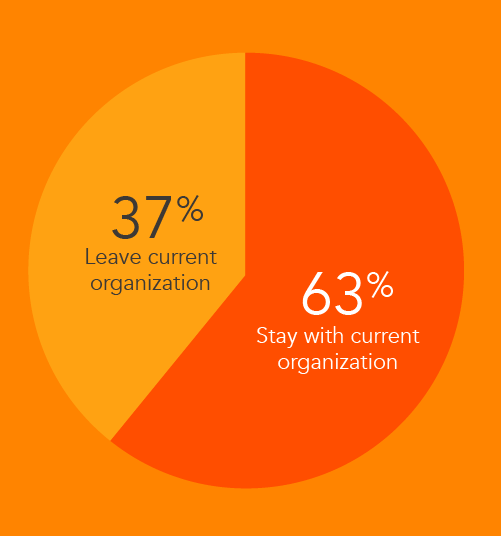
Of those who plan to leave their current company, 22% will remain working in recruitment, while 15% plan to leave the industry entirely. Recruiters with three to ten years of experience are most likely to stay.
A positive trend despite some challenges
Though recruiters are less satisfied with their compensation and don’t feel as valued by their organizations, the latest physician recruiter job satisfaction survey shows their work/life balance has improved — and most recruiters plan to remain with their current companies in the next three years.
Click the image below to download the PDF one-sheet version of this article:
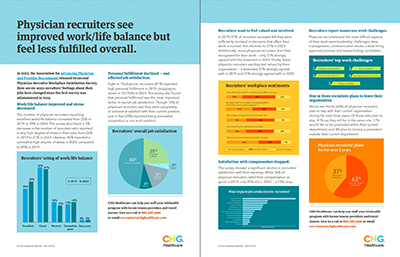
CHG Healthcare can help you find the doctors, nurses, and allied professionals you need to staff your facility. To learn more about our staffing solutions, give us a call at 866.588.5996 or email ecs.contact@chghealthcare.com.